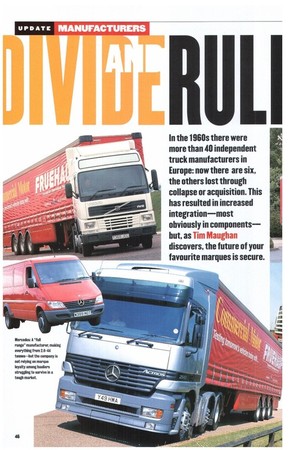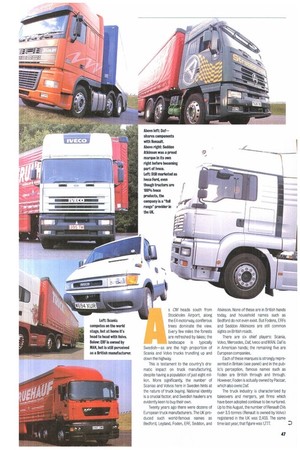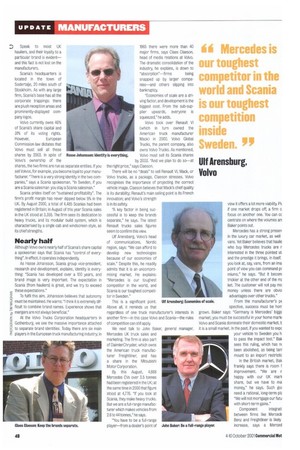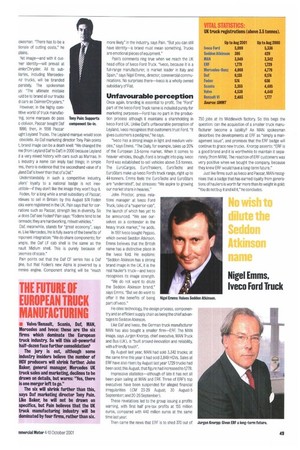R
Page 46

Page 47

Page 48

Page 49

If you've noticed an error in this article please click here to report it so we can fix it.
In the 1960s there were more than 40 independent truck manufacturers in Europe: now there are six, the others lost through collapse or acquisition. This has resulted in increased integration—most obviously in components but, as Tim Maughan discovers, the future of your favourite marques is secure.
s CM heads south from Stockholm Airport, along the E4 motorway, coniferous trees domlnate the view. Every few miles the forests are refreshed by lakes; the landscape is typically Swedish—as are the high proportion of Scania and Volvo trucks trundling up and down the highway.
This is testament to the country's dramatic impact on truck manufacturing, despite having a population of just eight million. More significantly, the number of Scanias and Volvos here in Sweden hints at the nature of truck buying. National identity is a crucial factor, and Swedish hauliers are evidently keen to buy their own.
Twenty years ago there were dozens of European truck manufacturers. The UK produced such world-famous names as Bedford, Leyland, Foden, ERF, Seddon, and Atkinson. None of these are in British hands today, and household names such as Bedford do not even exist. But Fodens, ERFs and Seddon Atkinsons are still common sights on British roads.
There are six chief players: Scania, Volvo, Mercedes, Daf, iveco and MAN. Oaf is Er American hands: the remaining five are European companies.
Each of these marques is strongly represented in Britain (see panel) and in the public's perception, famous names such as Foden are British through and through. However, Foden is actually owned by Paccar, which also owns Dat The truck industry is characterised by takeovers and mergers, yet firms which have been adopted continue to be nurtured. Up to this August, the number of Renault CVs over 3.5 tonnes (Renault is owned by Volvo) registered in the UK was 2,403. The same time last year, that figure was 1,777.
Speak to most UK hauliers, and their loyalty to a particular brand is evident— and this fact is not lost on the manufacturers.
Scania's headquarters is located in the town of Sodertalje, 20 miles south of Stockholm. As with any large firm, Scania's base has all the corporate trappings: there are plush reception areas and prominently-displayed company logos.
Volvo currently owns 46% of Scania's share capital and 31% of its voting rights.
However, European Commission law dictates that Volvo must sell all these shares by 2003. In spite of Volvo's ownership of the shares, the two firms are run as separate entities. If you sell Volvos, for example, you become loyal to your manufacturer. "There is a very strong identity in the two companies," says a Scania spokesman. "In Sweden, if you are a Scania salesman you stay a Scania salesman."
Scania prides itself on "sustained profitability". The firm's profit margin has never dipped below 5% in the UK. By August 2000, a total of 4,485 Scanias had been registered in Britain; in August of this year Scania sales in the UK stood at 3,355. The firm sees its dedication to heavy trucks, and its modular build system, which is characterised by a single cab and windscreen style, as its chief strengths. Hasse Johanson: Identity is everything.
Nearly half
Although VoNto owns nearly half of Scania's share capital a spokesman says that Scala has "control of everything". In effect, it operates independently.
As Hasse Johansson, Scania group vice-president, research and development, explains, identity is everything: "Scania has developed over a 100 years, and brand image is very important. The expectation in Scania [from hauliers] is great, and we try to exceed these expectations."
To fulfil this aim, Johansson believes that autonomy .7c must be maintained. He warns: "I think it is extremely difficult to combine brand names, Experience shows that mergers are not always beneficial."
± At the Volvo Trucks Corporation headquarters in g Gothenburg, we see the massive importance attached g to separate brand identities. Today there are six main k players in the European truck manufacturing industry; in
1965 there were more than 40 major firms, says Claes Claeson, head of media relations at Volvo. The dramatic consolidation of the industry, he explains, is down to
"absorption"—firms being snapped up by larger companies—and others slipping into bankruptcy.
"Economies of scale are a driving factor, and development is the biggest cost. From the sub-supplier upwards, everyone is squeezed," he adds.
Volvo took over Renault VI (which in turn owned the American truck manufacturer Mack) in 2000. Volvo Global Trucks, the parent company, also owns Volvo Trucks. As mentioned, Volvo must sell its Scania shares by 2003. 'And we plan to do so—at the right price," says Claeson.
There will be no "deals" to sell Renault VI, Mack, or Volvo trucks, as a package, Claeson stresses. Volvo recognises the importance of projecting the correct vehicle image. Claeson believes that Mack's chief quality is its durability; Renault's main selling point is its French innovation; and Volvo's strength is in its safety.
"A key factor in being successful is to keep the brands separate," he says. The latest Renault trucks sales figures seem to confirm this view.
Ulf Arensberg, Volvo's head of communications, Nordic region, says: "We can afford to develop new technologies because of our economies of scale." Despite this, he readily admits that it is an uncompromising market. He explains: "Mercedes is our toughest competitor in the world, and Scania is our toughest competitor in Sweden."
This is a significant point. Above all, it reminds us that regardless of one truck manufacturer's interests in another firm—in this case Volvo and Scania—the rules of competition can still api* WI Arensberg: Economies of scale, We next talk to John Baker, general manager, Mercedes UK truck sales and marketing. The firm is also part of BaimlerChrysler, which owns the American truck manufacturer Freightliner, and has a share in the Mitsubishi Motor Corporation.
By this August, 4,668 Mercedes CVs over 3.5 tonnes had been registered in the UK; at the same time in 2000 that figure stood at 4,776. "If you look at Scania, they make heavy trucks. But we are a full-range manufacturer which makes vehicles from 2.6 to 44 tonnes," he says.
"You have to be a full-range player—from a dealer's point of
view it offers a lot more viability. Plt if one market drops off, a firm c focus on another one. You can cc centrate on where the volumes an Baker points out.
Mercedes has a strong presen in the luxury car market, as well vans. Yet Baker believes that hauliE who by Mercedes trucks are r interested in the three pointed St and the prestige it brings, in itself. you look at, say, vans, from an ima point of view you can command pr miums," he says. "But it becom trickier at the other end of the IN ket. The customer will not pay mo money unless there are obvio advantages over other trucks."
From the manufacturer's pE spective, success must be nom grown. Baker says: "Germany is Mercedes' biggE market; you must be successful in your home marki Volvo and Scania dominate their domestic market, t it is a small market. In the past, if you wanted to expc your vehicle to Sweden you it to pass the impact test." Bak sees this ruling, which has been abolished, as being tanl mount to an import restrictic In the British market, Bak frankly says there is room f improvement. "We are r happy with our UK marl share, but we have to ma money," he says. Such gc:q need a rational, long-term pit "We will not mortgage our tutu with short-term gains."
Component integrati between firms like MercedE Benz and Freightliner is likely increase, says a Merced okesman. "There has to be a tionale of cutting costs," he plains.
Yet image—and with it custier identity—will prevail at iimlerChrysler. All its subformes, including Mercedes:nz trucks, will be branded parately. The spokesman ys: The ultimate mistake iuld be to brand all our trucks d cars as DaimlerChryslers." However, in the highly corntitive world of truck manufacIng, some marques do pass o oblivion. Paccar bought Daf 1996; then, in 1998 Paccar ught Leyland Trucks, The Leyland marque would soon obsolete. As Daf marketing director Tony Pain points t, brand image can be a death knell: "We changed the me [from Leyland Daf to Del in 2000 because Leyland U a very mixed history with cars such as Marinas. In s industry a name can imply bad things; in simple ms, there is evidence that the secondhand value of a viand Daf is lower than that of a Daf."
Understandably in such a competitive industry, uliers' loyalty to a national badge is not inexustible—if they don't like the image they won't buy it. Foden, for a long while a small subsidiary of Paccar, ntinues to sell in Britain: by this August 574 Foden icks were registered in the UK. Pain says that for corrations such as Paccar, strength lies in diversity. So N does Daf see FodenP Pain says: "Fodens tend to be .ormade; they are hardworking, robust vehicles."
Dar, meanwhile, stands for "great economy", says in. Like Mercedes, He is fully aware of the benefits of mponent integration: We do share components; for ample, the Daf LF cab shell is the same as the nault Midlum shell. This is purely because of 3nomies of scale."
Tony Pain: Supports component tie-in.
Pain points out that the Daf CF series has a Daf gine, but that Foden's new Alpha is powered by a mmins engine. Component sharing will be "much more likely" in the industry, says Pain. "But you can still have identity—a brand must mean something. Trucks are emotional pieces of equipment."
Pain's comments ring true when we reach the UK head office of Iveco Ford Truck. "Iveco, because it is a full-range manufacturer, is market leader in Italy and Spain," says Nigel Emms, director, commercial communications. No surprises there—Iveco is a wholly owned subsidiary of Fiat.
Unfavourable perception
Once again, branding is essential to profit. The 'Ford" part of the Iveco Ford Truck name is included purely for marketing purposes—Ford has no part in the production process although it maintains a shareholding in Iveco Ford UK. Unlike Oaf's unfavourable perception of Leyland, iveco recognises that customers trust Ford. "It gives customers a pedigree," he says.
"Iveco has a strong image in light and medium vehicles," says Emms. "The Daily, for example, takes up 20% of the European 3.5-tonne market. When it comes to heavier vehicles, though, Ford is brought into play. Iveco Ford was established to sell vehicles above 3.5 tonnes. The EuroCargos, EuroTrakkers, EuroTechs and EuroStars make up Iveco Ford's truck range, right up to 44-tonners. Emms feels the EuroTechs and EuroStars are "underrated", but stresses: "We aspire to growing our market share in heavies."
John Proctor, press relations manager at Iveco Ford Truck, talks of a "superior cab", the launch of which has yet to be announced. "We see ourselves as a contender in the heavy truck market," he adds.
In 1991 Iveco bought Pegaso, which owned Seddon Atkinson. Emms believes that the British name has a distinctive place in the Iveco fold. He explains: 'Seddon Atkinson has a strong brand image in the UK, it is the real haulier's truck—and lveco recognises its image strength.
"We do not want to dilute the Seddon Atkinson brand," says Emms. "But we do want to offer it the benefits of being part of Iveco."
He cites technology, the design process, componentry and an efficient supply chain as being the chief advantages to Seddon Atkinson.
Like Daf and Iveco, the German truck manufacturer MAN has also bought a smaller firm—ERF. The MAN image, says Jurgen Knorpp, chief executive, MAN Truck and Bus (UK), is "built around innovation and reliability, with a friendly touch".
By August last year, MAN had sold 3,342 trucks: at the same time this year it had sold 3,849 HGVs. Sales at ERF have also risen: by August last year 1,729 trucks had been sold; this August, that figure had increased to 1,78.
Impressive statistics—although of late it has not all been plain sailing at MAN and ERF. Three of ERF's top executives have been suspended for alleged financial irregularities (CM 23-29 August; 30 August-5 September; and 20-26 September).
These revelations led to the group issuing a profits warning, with first half pre-tax profits at 155 million euros, compared with 440 million euros at the same time last year.
Then came the news that ERF is to shed 370 out of 750 jobs at its Middlewich factory. So this begs the question: can the acquisition of a smaller truck manufacturer become a liability? An MAN spokesman describes the developments at ERF as "simply a management issue", and promises that the ERF badge will continue to grace new trucks. Knorpp asserts: "ERF is a good brand and it is worthwhile to maintain it separately [from MAN[. The reaction of ERF customers was very positive when we bought the company, because they knew ERF would have a long-term future."
Just like firms such as Iveco and Paccar, MAN recognises that a badge that has earned loyalty from generations of hauliers is worth far more than its weight in gold: "You do not buy it and kill it," he concludes.
















































































































































